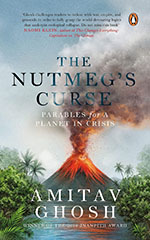Amitav Ghosh’s The Nutmeg’s Curse is a work of post-genre literature. It is at once story, scholarly treatise, history, anthropology, folklore, memoir, diary, manifesto, and prose poetry. To call it a text would be unfair, for its very polemical and philosophical axis is agency. Moreover, it has been crafted with that rare artistry which, concealing itself as spontaneity, confers on the work a complex organic wholeness. It moves like a story, glimmers like a poem, and rambles searchingly like an essay. It is a banyan of an essay, intricate and sprawling, in which several stories nest.
Considering the complexity of the planetary crisis, which is what the book is about, how else could Ghosh have written it except as he has, as a post-genre work? The crisis is a fluid, protean monster. Only an equally fluid, protean monster could have captured it. That is what the essay, precisely and profoundly, is. But Ghosh’s is a charming monster, a being of curves and ripples, of eddies and echoes.
Continue reading this review

